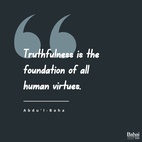The views expressed in our content reflect individual perspectives and do not represent the official views of the Baha'i Faith.
Do you trust your senses? Most of us do, even though we know scientifically that our faculties of sight, hearing, smell, taste and touch can often steer us wrong.
Those five senses especially fail when it comes to the perception of spiritual realities. Your senses, for example, can’t determine whether a Creator exists.
The Baha’i teachings do not regard the way of the senses as a reliable standard for investigating the existence of God. When Abdu’l-Baha gave a talk in about that subject in October of 1912 in San Francisco, he said that epistemology refers to four human standards, and the first of these is that of reason, of logic, of science. All three of these concepts are related to the functioning of the human mind or intellect, an attribute and power which makes man distinct from the animal kingdom:
Man is distinguished above the animals through his reason. The perceptions of man are of two kinds: tangible, or sensible, and reasonable, whereas the animal perceptions are limited to the senses, the tangible only … As to the animal: It is endowed only with sense perception. It is lacking the reasonable perception … Virtue, or perfection, belongs to man, who possesses both the capacity of the senses and ideal perception. – Abdu’l-Baha, The Promulgation of Universal Peace, p. 357.
What did Abdu’l-Baha mean by these words, “reason,” “logic,” and “science”?
Man is distinguished above the animals through his reason. The perceptions of man are of two kinds: tangible, or sensible, and reasonable, whereas the animal perceptions are limited to the senses, the tangible only. The tangible perceptions may be likened to this candle, the reasonable perceptions to the light. Calculations of mathematical problems and determining the spherical form of the earth are through the reasonable perceptions. The center of gravity is a hypothesis of reason. Reason itself is not tangible, perceptible to the senses. Reason is an intellectual verity or reality. All qualities are ideal realities, not tangible realities. For instance, we say this man is a scholarly man. Knowledge is an ideal attainment not perceptible to the senses. When you see this scholarly man, your eye does not see his knowledge, your ear cannot hear his science, nor can you sense it by taste. It is not a tangible verity. – Ibid.
Apparently, he wanted us to understand that the human ability to go beyond the tangible, to think logically and to draw conclusions from that thinking offers us much more insight into reality than our senses:
Man’s inventions have appeared through the avenue of his reasonable faculties. All his scientific attainments have come through the faculty of reason. – Ibid., pp. 357-358.
That reasoning faculty—the ability to have an abstract thought, to consider it logically, and to follow it through to a conclusion—is unique to human beings. Through it we make art, science, technology, medicine and great civilizations.
That’s why the Baha’i teachings exalt science and the arts—they bring us closer to the spiritual reality inherent in each one of us:
The man of science is perceiving and endowed with vision, whereas he who is ignorant and neglectful of this development is blind. The investigating mind is attentive, alive; the callous and indifferent mind is deaf and dead. A scientific man is a true index and representative of humanity, for through processes of inductive reasoning and research he is informed of all that appertains to humanity, its status, conditions and happenings. He studies the human body politic, understands social problems and weaves the web and texture of civilization. In fact, science may be likened to a mirror wherein the infinite forms and images of existing things are revealed and reflected. It is the very foundation of all individual and national development. Without this basis of investigation, development is impossible. Therefore, seek with diligent endeavor the knowledge and attainment of all that lies within the power of this wonderful bestowal. – Ibid., pp. 49-50.

















Comments
Sign in or create an account
Continue with Facebookor